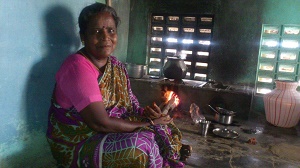LIVELIHOOD

Gone are the days when banks were considered to be meant for the privileged few and endowed rich. Poor households find challenging to find a safe place to keep the hard earned money, not to talk of their toils to get a nod for loans due to their inability to demonstrate banking history and produce desired collateral. The daily wages of the less-endowed are considered to be too small deserving to be banked. Women blessed with a thrift culture stand out in the present day culture of spend thrift behavior, rattling many resource-poor households with most money going to like alcohol and cigarettes preceding other priorities like women health, family welfare and child care. Our women collective is now a most-sought-after client by banks as it proves to be cheap and effective demand aggregator with considerable cost saving for banks and all the more proving to be a better credit-compliant client for banks demonstrating good repayment cult.
Through banking on change initiative we nurtured a formal savings culture by graduating traditional thrift habits resulting in a huge pile of savings worth INR 20.9 crore with an average of over INR 6,000 which was adequate to shake the banks to consider them for credit services. Women collectives though were earlier predominantly a mass of historically unbanked population have now made banks to come into their stride due to their economic strength of cumulatively posting of INR 20.9 crores deposits. As little drops make an ocean, women collectives are indomitably grown to greater stature by leveraging bank loan worth INR 1 billion from 10 banks and financial institutions, all in a period of five and half years.
Developing strong accounting systems in women collectives, creation of good credit history through efficient internal loan rotation system, inclusive and participatory governance in collectives, and transparency in money dealt at community level, robust group dynamics with good documentation of group processes like group meetings and internal loan decisions have made banks make a beeline to support women collectives. The tiny women collectives have changed the face of banking by offering banks collateral substitutes through social capital and peer pressure. Women leaders of 2,599 Self Help Groups created through our Banking on Change initiative walk in like an extended arm of formal banks, as mini banks addressing the credit needs to neighborhoods, as moving banks operating 24×7, smiling all throughout with a personal touch. That way collectives prove to be a live and interactive Any Time Money (ATM) considered to be a gifted possession in an otherwise mechanical financial world.
Banking on Change initiative supported by Barclays has created a billion worth loan opportunity for 36,535 rural women to set up enterprises and get employment in Cuddalore, Nagapattinam and Kancheepuram districts in Tamil Nadu.




